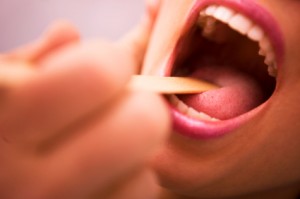A snoring person should first try to
- Lose weight,
- Sleep on one side (not on the back),
- Get more exercise,
- Avoid alcohol and sleeping pills before sleeping,
- Use various available antisnoring sprays and devices.
If these measures are not effective, it is necessary to see an otorhinolaryngologist to identify the cause(s) of the snoring and to plan further diagnostic and therapeutic procedures.
Nonsurgical treatment
In case of evident apneas (breathing stops longer than ten seconds) and excessive daytime sleepiness, it is advisable to visit a specialist for sleep disturbances. They will perform several additional examinations, the most important being night polysomnography. If the results of the assessment so indicate, the specialist will prescribe a continuous positive pressure (CPAP) mask. This is a device that pushes air through nose or mouth. By applying constant positive pressure, it improves breathing by expanding the airway.
Surgical treatment
If the noninvasive procedures mentioned above do not achieve the desired effect (or you do not want to use CPAP mask), surgical intervention should be considered. Do not be afraid of surgery! The operations are usually minor, most often performed under local anesthesia in an outpatient office. The type of operation required is based on the careful identification of the basic cause of the snoring.
Curing snoring improves breathing and sleep
Surgical procedures that stop snoring
Snoring can only be permanently solved with procedures that remove airway obstacles. One such operation is uvulopalatoplasty:
Uvulopalatoplasty
Uvulopalatoplasty is a procedure that reshapes the soft palate. It is performed in local or general anestesia.
The soft palate plays an important role in snoring. It is the most frequent obstacle to the flow of air and at the same time is the structure that air pressure perturbations start vibrating. The vibrating soft palate is the source of the snoring sound.
The surgical reshaping of the soft palate opens the air passage and establishes smooth breathing without snoring. To achieve this, it is necessary to shorten the soft palate while preserving its natural shape.
Surgically, the extent of the procedure and the postoperative course of the uvulopalatoplasty operation can be compared to tonsillectomy.
Local anesthesia means that the mouth, pharynx, and soft palate are anaesthetized with anesthetic spray and anesthetic injections into the soft palate. The patient feels no pain and can be discharged one hour after the operation.
The healing following surgery lasts about one week. During this time painkillers and antibiotics should be taken and soft sterile (cooked) food ingested.
In certain cases it is also necessary to remove enlarged tonsils and possibly obstacles in the nose to prevent snoring. If the snoring person is overweight the results of surgery can be further improved by losing weight.
NOTE: There are certain procedures (coblation, radiofrequency, implants, and injections of various substances) that stiffen the soft palate to prevent snoring. These procedures are not very effective. While they mitigate snoring, they do not improve impaired breathing.


 English
English Italiano
Italiano  Hrvatski
Hrvatski  Slovensko
Slovensko